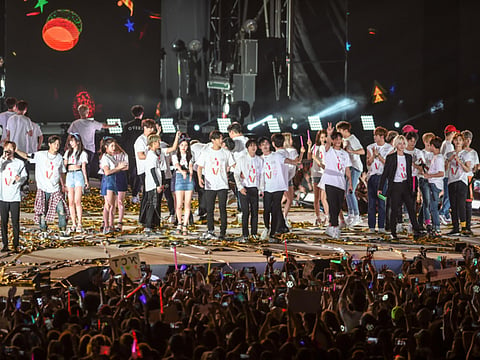UAE’s K-Wave deconstructed
A new study reveals why Korean entertainment is a big deal for UAE residents

Titled Say Hello to Hallyu (Style)Emirati Nation - The Rising Korean Wave among Emirati Women and its Impact on their Cultural Identity, the study was conducted by Urwa Mohammad Tariq, a UAE University teaching and research assistant, who is also pursuing her PhD in Mass Communication.
Revealing the findings of the first-of-its kind study to XPRESS, Urwa said, “What prompted me to undertake the study was the level of obsession Emirati girls had over Korean entertainment when I joined university. Whether it was on the bus, in the classroom, canteen, corridors and even the hostel, conversations revolved around Korean actors, K-pop, drama and social media updates. When the university launched a new course on Korean language, there were no seats available. For me, this was a new phenomenon.”
Eye-opener
She said a K-pop concert in Abu Dhabi on March 26 also served as an eye-opener as students present were largely Emirati. “The place was packed as was evident through media coverage. I did an observational study. Encouraged by the response, I undertook a formal academic research with support from my professors.”
What prompted me to undertake the study was the level of obsession Emirati girls had over Korean entertainment”
She said the qualitative research utilised a focus group of Emirati women, aged 19 to 25, from UAE University. Though they were avid followers of Korean entertainment, they also had good knowledge about local and other foreign sources of entertainment.
The study essentially set out to identify the reasons behind the K-wave. “It also recognised indicators as possible threats to cultural identity and provided recommendations on how to respond to the growing online K-wave while preserving local identity,” said Urwa.
So what is it about Korean culture that draws people from the UAE to it? And why?
Urwa said, “Korean entertainment is usually dream-centric where the protagonist’s role is unpredictable. They show parts of life such as friendship and other healthy relationships along with teaching their viewers morals and lessons.”
Korean performers share a strong rapport with audiences in the UAE due to cultural similarities, says Urwa's qualitative study.
She said, “Young Emirati women prefer to watch international dubbed entertainment as they seek to learn about new cultures and watch shows that specially address universally social issues. The enthusiasm, social satisfaction, emotions and leisure help them escape their reality and relate to the character through their own experiences. Moreover, Emirati women claimed that Korean values are similar to the traditional ideas that resonate with the Middle Eastern viewers’ beliefs.”
She said the study found that the hot favourites in K-pop were EXO, BTS, Park Hyung Shik, Nam Joo Shik, Lee Jong Suk, Song Jong Ki, Infinite and TWICE while popular shows and dramas included Hello Counselor, Mystic Messenger, The Return of Superman and K Pop Star, Heartstrings, Boys over Flowers and Descendants of the Sun.
Urwa said she was intrigued by a rising cyberspace community among local girls, specifically on Twitter and Instagram. “The K-wave has given Emirati women a strong sense of group identity which was rarely seen before. I cannot help but think that Emiratis in this study belong to the UAE geographically, and yet engage virtually with the Korean culture. They feel that Emirati and Korean cultures share common grounds. In both cultures, poetry, romance, social relationships and friendships are highly valued, especially by women.”
She said respondents in the study admitted that Korean showbiz did not appeal to boys nor adults as femininity is the key concept of Korean culture. “The majority were uneasy viewing K-showbiz in front of elders. Most parents assumed it was similar to western culture and could consist of adult content.”
Idea of romance
Urwa said respondents felt Korean dramas were “cleaner” in terms of language and content compared to western shows. “They highlighted their definition of romance with words like “simple”, “loyal”, “cute” and “shy” with Korean dramas having a moderately slow pace in terms of emotions, giving viewers a chance to comprehend feelings and empathise with characters.”
While respondents said Indian movies and songs were their family members’ first choice when it came to entertainment, they themselves felt the Indian fare was becoming more like Hollywood in terms of music, style and film locations. They felt Indian serials were inferior to Korean serials with regard to storyline, cinematography, direction, characters, predictability and performance.
Urwa said the study’s findings were significant, but were restricted to only one focus group. She hoped future studies would use a quantitative approach to understand effects of Hallyu on Emirati identity.
YOUSPEAK
What are your views about the study and the story?
Write to us at:
editor@xpress4me.com
Whatsapp: 056 508 9988



